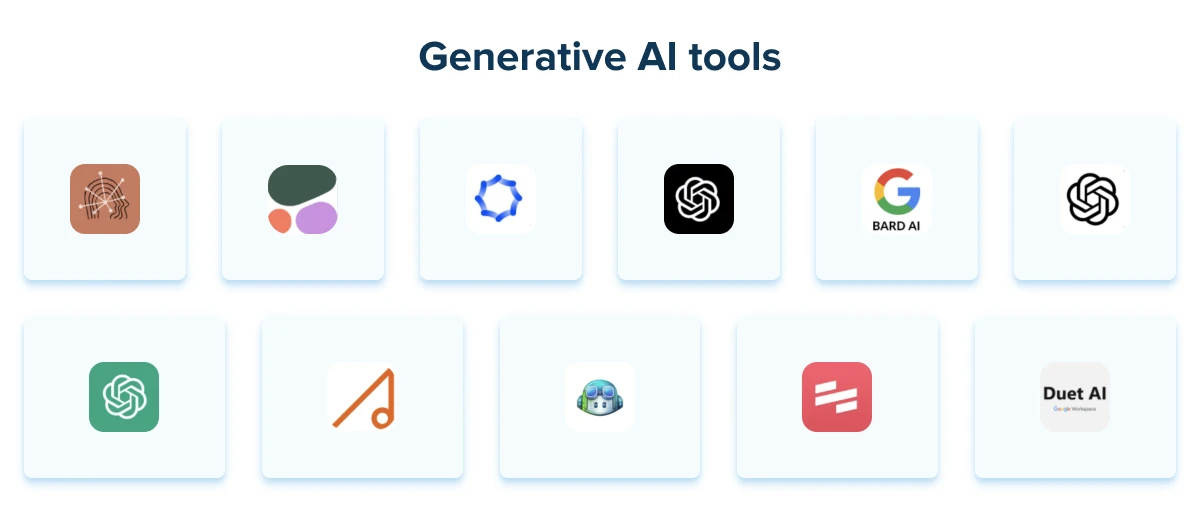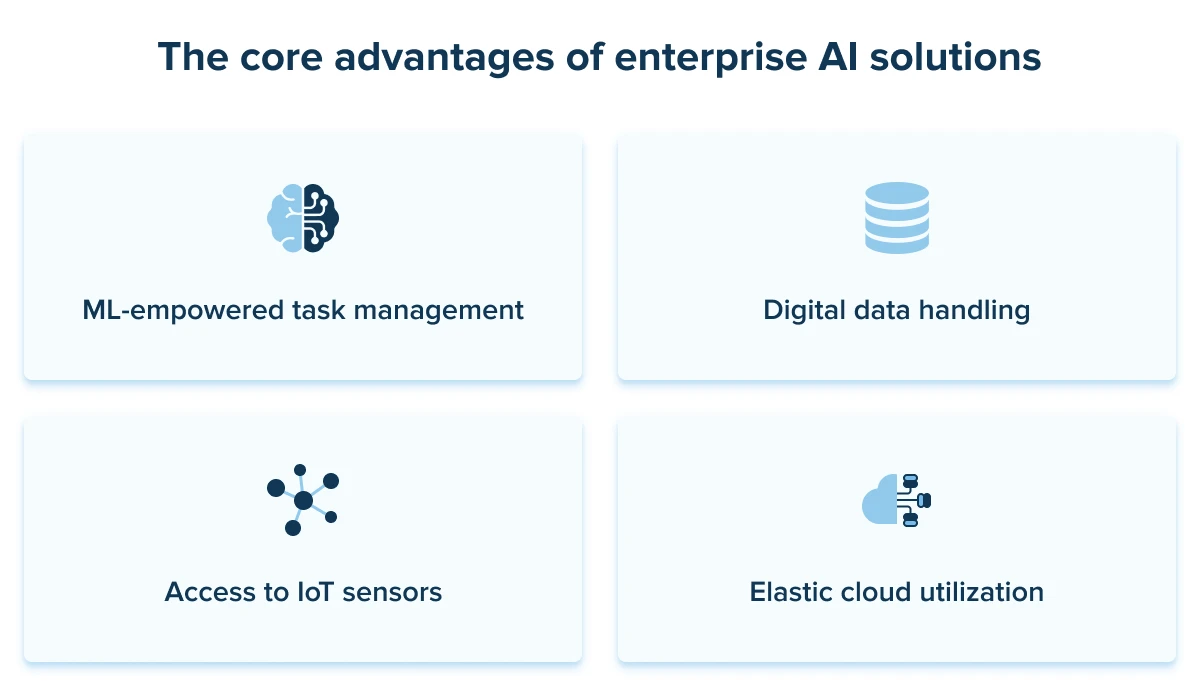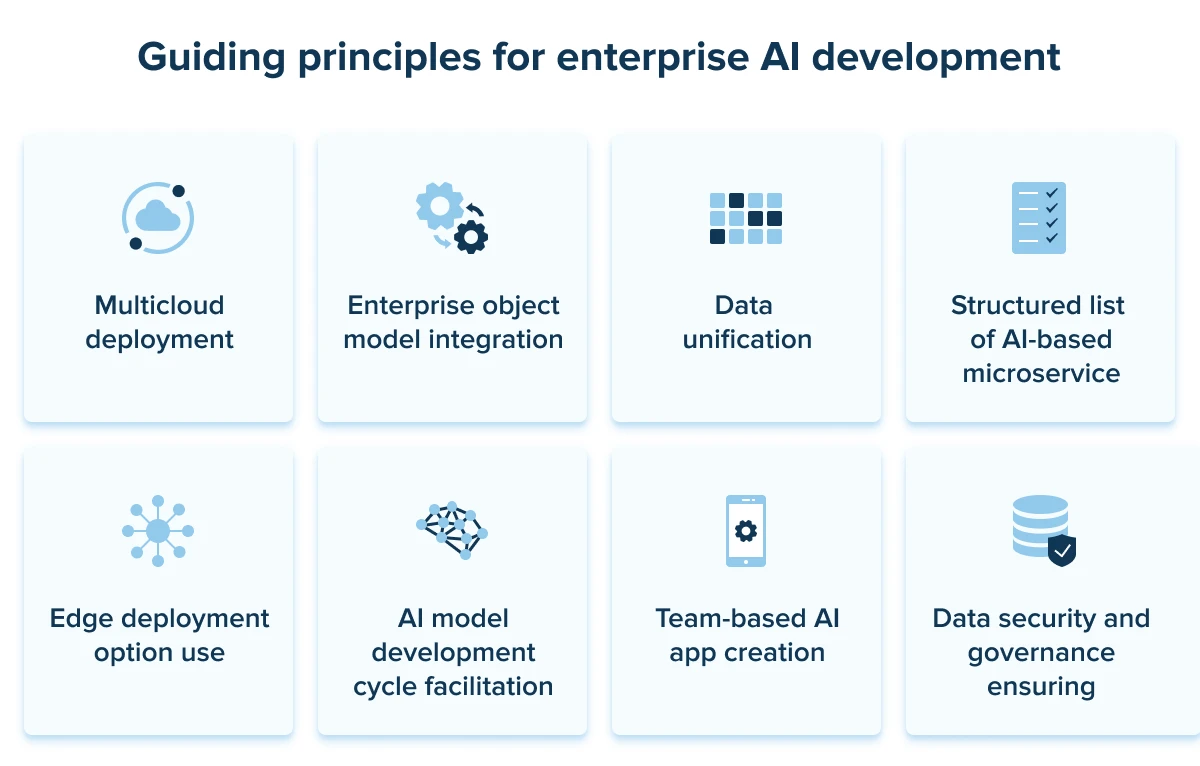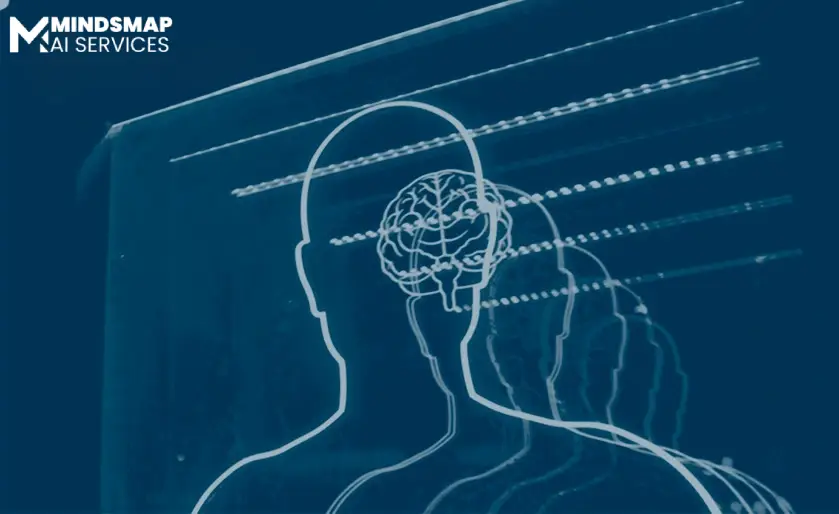Businesses of all domains and sizes can gain a competitive edge by leveraging automation in their processes and operations. Enterprise AI development solutions can help companies improve decision-making and increase efficiency, productivity, and profitability. AI-powered tools like chatbots enhance customer service, while predictive maintenance systems reduce downtime and expenses.
This article discusses the concept of an enterprise AI solution, the difference between regular AI and enterprise AI, the potential advantages of implementing such a solution on the enterprise AI market, and many other essentials. Start reading the guide to dive deeper into the intricacies of enterprise software creation empowered with artificial intelligence.
Enterprise AI software: Basics you should consider
Enterprise AI applications are software programs that utilize AI technologies to enhance business flows and decision-making within a company’s operational environment. These applications can range from customer service AI chatbots that offer prompt customer support to fraud detection systems that analyze transaction data, predictive maintenance systems, and supply chain optimization tools that simplify inventory and transportation costs.
Moreover, AI in enterprise can be used for repetitive tasks automation (e.g., info entry, report generation), as well as for freeing up human employees to focus on more strategic work. Artificial intelligence also identifies patterns, predicts trends, and generates insights that inform better decision-making across all levels of the organization. It is possible on the basis of the vast amounts of enterprise data analyzed.
Enterprise AI solutions offer versatility and adaptability, meeting the unique needs of
various organizations in industries, including healthcare, finance, manufacturing, and
retail. Such a diversity of
benefits is available due to generative AI tools that can be tailored and customized to
address specific challenges and opportunities within each industry.
Generative AI tools to use when developing
enterprise apps (e.g., enterprise AI chatbot).

Enterprise AI applications offer a powerful toolkit for businesses, but it’s important to distinguish them from the broader field of artificial intelligence. While AI includes a wide range of technologies, Enterprise AI focuses specifically on solving business problems and optimizing operations within a company’s unique environment. This targeted approach allows Enterprise AI to leverage vast amounts of internal data and industry-specific knowledge to generate solutions tailored to a company’s specific needs.
To ensure successful implementation, enterprise AI software requires a robust, scalable, and secure underlying architecture. This architecture typically includes components like data storage and management systems, machine learning models, training pipelines, and integration layers to connect with existing enterprise systems. These components work together to support a wide range of enterprise AI examples, such as fraud detection systems, predictive maintenance tools, and intelligent chatbots.
By leveraging this sophisticated architecture, enterprise AI software unlocks a multitude of benefits that can transform your business operations. Let’s discuss the advantages of implementing AI solutions for enterprises.
The major enterprise AI software advantages
Now, we’ll highlight the most important benefits of artificial intelligence solutions for businesses in the enterprise AI market, exploring how they can revolutionize various aspects of your business operations.
Task management boosted by ML
Machine learning is a significant advancement in the field of artificial intelligence and is helpful in enterprise AI development. It enables machines to learn and improve by analyzing data without explicit programming. These systems learn from patterns within the training data instead of following specific rules. They are highly flexible, allowing for quick adaptation to changing conditions and business requirements. ML algorithms (e.g., deep learning for image recognition) have demonstrated superior performance in various applications, including medical diagnostics and customer churn detection, as well as in areas like operational reliability and demand forecasting.
Businesses can leverage these advancements by partnering with a company offering machine learning development services. This allows the companies to harness the power of ML without the need for in-house expertise, enabling them to develop and deploy custom ML models that address their specific challenges and unlock new opportunities.

Source: Unsplash
Access to IoT sensors
The usage of IoT sensors has become increasingly prevalent across industries such as energy, manufacturing, and healthcare. This has enabled organizations to gain real-time visibility and insights into their operations. However, managing and acting on real-time data can be challenging. It’s where enterprise AI development solutions come in handy, as they offer several benefits, including predictive maintenance and fraud monitoring.
Elastic cloud utilization
The utilization of elastic clouds has gained widespread acceptance in the training of AI and ML systems. During the training process, the optimal weights and parameters are determined to deliver accurate results. While larger datasets and more iterations enhance performance, they also necessitate more storage.
Managing storage for multiple ML models in enterprise AI solutions can be a challenging task. However, cost-effective cloud-based systems can facilitate model training. Elastic Cloud provides managed services for AI applications, freeing up IT resources. It works seamlessly with the Elastic Stack for data analysis and visualization. This enables organizations from different industries to make informed decisions based on their enterprise AI development solutions.
Digital data handling
Enterprise AI solutions proceed with digital data instead of paper data for better efficiency. The success of AI solutions largely depends on the availability of high-quality and diverse data. Many AI solutions use supervised learning with well-labeled data, while unsupervised learning benefits from larger datasets for better anomaly detection.
Large and diverse datasets, including historical data, are crucial for enhancing the performance of enterprise artificial intelligence (AI) and machine learning (ML) systems. As the amount and sources of data increase, the success of enterprise AI and machine learning systems will continue to grow.

In order to benefit from the above-mentioned enterprise AI examples and speed up your business flows, you can contact an IT vendor with hands-on experience in such solutions development. They’ll start the enterprise software development process that tailors a solution to your specific needs, leverages cutting-edge AI technologies, and seamlessly integrates with your existing software systems, ensuring a smooth and efficient implementation.
Core principles for building artificial intelligence for enterprise applications
Building enterprise AI solutions requires a multi-step process. Firstly, you need to define your business goals and identify areas where AI can provide value. Then, data collection and preparation are crucial for training effective AI models. Finally, choosing the right AI technology and development partner ensures a secure, scalable solution that integrates seamlessly with your existing systems.
Let’s talk more about the principles you should stick to when building your enterprise AI software along with your skilled vendor (e.g., when they render you enterprise AI chatbot development service).
Multicloud deployment
This approach used to implement artificial intelligence for enterprise applications, utilizes the strengths of multiple cloud platforms, unlocking significant benefits for businesses:
- Multi-cloud offers access to a broader range of resources, including cutting-edge AI tools and specialized hardware configurations. This expanded resource pool allows you to customize your AI development environment to meet specific needs, which can improve model performance and training efficiency. Leveraging AI consulting services can further enhance the multi-cloud approach by providing expertise in selecting the right cloud platforms, tools, and configurations for your unique AI project.
- Multi-cloud deployment enables scalability. As your AI solution evolves and data volumes increase, you can seamlessly scale resources across different cloud providers without any performance bottlenecks.
- Multi-cloud strategies can lead to significant cost savings. By leveraging on-demand pricing models and comparing offerings from various providers, you can achieve substantial financial benefits compared to a single-cloud approach, fostering an optimistic outlook on your AI investment. Multi-cloud deployment enhances disaster recovery capabilities.
Distributing your AI solution and data across geographically diverse cloud environments minimizes risks associated with outages or natural disasters in any location, ensuring business continuity and data security for your essential AI initiatives.
Data unification and integration
Data unification and integration are essential for improving processes within companies. They ensure that data is up-to-date by collecting and analyzing information from various sources such as old IT systems, online sources, and sensor networks. This unified data becomes the foundation for leveraging the power of AI.
Fueled by integrated data, AI enterprise workflows train machine learning models and build AI applications for task automation, operational optimization, and generating strategic insights. For instance, you can consider implementing an enterprise AI chatbot development service to automate customer service inquiries and improve overall customer experience.
Watch the video to know more about the benefits of chatbots for customer service:
Edge deployment utilization
Using edge deployment options is a strategic approach to integrating AI into your business, especially when real-time processing and low-latency response are critical. Deploying AI models directly on devices at the network edge reduces the need for constant data transfer to centralized servers. It minimizes latency and enhances data privacy and security by keeping sensitive information closer to its source.
Additionally, edge deployment enables scalability and flexibility, allowing AI applications to adapt to varying network conditions and device capabilities. By using this strategy, enterprises can unleash the potential of AI in decentralized environments while ensuring efficient and responsive operations.
Team-based AI app development
Team-based AI app creation is an effective strategy for creating enterprise AI solutions. It harnesses the collective expertise and diverse perspectives of multidisciplinary teams.
By assembling teams comprising data scientists, domain experts, software engineers, and business analysts, enterprises can ensure comprehensive coverage of all aspects of AI application development. This collaborative approach fosters innovation, accelerates problem-solving, and promotes the alignment of AI initiatives with business objectives.

Source: Unsplash
Moreover, team-based development encourages continuous learning and knowledge sharing and opens avenues for personal and professional growth. It facilitates integrating best practices and adopting emerging technologies, paving the way for the team and the enterprise to stay ahead in the AI landscape. Ultimately, enterprises can enhance agility, mitigate risks, and deliver robust solutions that drive sustainable business value by embracing teamwork in AI app creation.
EOM integration
An Enterprise Object Model (EOM) can provide a strategic advantage in ensuring the system’s robustness and coherence. The EOM is a highly adaptable tool that serves as a blueprint, defining the structure and relationships of various data objects and entities relevant to the organization’s operations.
By aligning the AI business solutions with the EOM, developers can streamline data handling, ensure consistency in information representation, and facilitate interoperability across different modules and systems. This becomes even more crucial when developing complex solutions like enterprise AI chatbot development services for E-commerce, where seamless data flow and consistency are paramount for optimal customer experiences.
AI microservices usage
Using AI-based microservices is a strategic approach for enterprise AI adoption. It breaks down complex AI functionalities into smaller, specialized microservices, enabling rapid prototyping, experimentation, and iteration. This facilitates the efficient deployment and scaling of AI capabilities tailored to evolving requirements. By using standardized interfaces and communication protocols, these microservices can be seamlessly integrated into existing enterprise workflows and applications.
Decoupling individual AI functionalities allows for easy updates and replacements, promoting adaptability and future-proofing AI infrastructure against technological advancements and changing business demands. Additionally, this approach empowers businesses to leverage specialized services like enterprise AI chatbot development services for websites, enabling them to integrate AI-powered chat functionalities seamlessly within their existing web presence.

Source: Unsplash
AI model development cycle facilitation
A structured AI model development cycle involves data collection, preprocessing, model training, validation, and deployment that can help streamline the process. This approach can ensure the creation and refinement of AI models tailored to specific business needs with efficiency.
An effective enterprise AI strategy leverages advanced tools like transfer learning and autoML techniques to significantly accelerate model development. This allows organizations to achieve faster deployment and iteration cycles. However, it’s crucial to emphasize continuous monitoring and feedback loops throughout the development process. It ensures that the deployed enterprise artificial intelligence models remain accurate and relevant.
By doing so, these models can adapt to evolving business needs and data dynamics, ultimately driving successful enterprise artificial intelligence transformation. For instance, you might leverage this approach to refine a custom AI chatbot development project, ensuring it delivers exceptional customer service experiences over time.
Data security and governance ensuring
Data security and governance are crucial while developing AI enabled enterprise software. They ensure compliance with regulations and safeguard sensitive information. Failure to use robust security measures could lead to data breaches, reputational damage, and legal consequences. Additionally, without clear data governance policies, data integrity, accuracy, and accessibility could be compromised, leading to ineffective decision-making and potential regulatory violations.
By prioritizing data security and governance, organizations can instill trust among stakeholders, mitigate risks associated with data breaches, and foster a culture of responsible data stewardship. Ultimately, this enhances the effectiveness and reliability of their enterprise AI solutions, especially those that leverage generative AI development to create novel content or data for specific business needs.

Conclusion
The enterprise version of AI, also known as enterprise AI, is a specific application of artificial intelligence focused on solving business problems and optimizing operations within a company. Unlike general AI, enterprise AI tailors its solutions to a company’s unique needs and environment, leveraging large amounts of data internally, as well as industry-specific knowledge. This targeted approach helps businesses operate enterprise AI software effectively, aligned with their strategic goals.
We’ve told you the essentials of what you should know about enterprise AI software development. If you need to obtain a full understanding of this topic, you should apply to a skilled enterprise solution creation company with deep expertise in work with AI. The enterprise AI development company can guide you through the entire building process, from defining your goals and selecting the right technology to building, deploying, and managing your custom AI solution, ensuring a successful journey towards a data-driven and future-proof organization.



